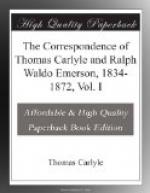--------- * Mr. Henry Barnard, of Hartford, Connecticut, to whom Emerson had given a note of introduction to Carlyle. ---------
But my errand is yet to tell. Some friends here are very desirous that Mr. Fraser should send out to a bookseller here fifty or a hundred copies of the Sartor. So many we want very much; they would be sold at once. If we knew that two or three hundred would be taken up, we should reprint it now. But we think it better to satisfy the known inquirers for the book first, and when they have extended the demand for it, then to reproduce it, a naturalized Yankee. The lovers of Teufelsdrockh here are sufficiently enthusiastic. I am an icicle to them. They think England must be blind and deaf if the Professor makes no more impression there than yet appears. I, with the most affectionate wishes for Thomas Carlyle’s fame, am mainly bent on securing the medicinal virtues of his book for my young neighbors. The good people think he overpraises Goethe. There I give him up to their wrath. But I bid them mark his unsleeping moral sentiment; that every other moralist occasionally nods, becomes complaisant and traditional; but this man is without interval on the side of equity and humanity! I am grieved for you, O wise friend, that you cannot put in your own contemptuous disclaimer of such puritanical pleas as are set up for you; but each creature and Levite must do after his kind.
Yet do not imagine that I will hurt you in this unseen domain of yours by any Boswellism. Every suffrage you get here is fairly your own. Nobody is coaxed to admire you, and you have won friends whom I should be proud to show you, and honorable women not a few. And cannot you renew and confirm your suggestion touching your appearance in this continent? Ah, if I could give your intimation the binding force of an oracular word!—in a few months, please God, at most, I shall have wife, house, and home wherewith and wherein to return your former hospitality. And if I could draw my prophet and his prophetess to brighten and immortalize my lodge, and make it the window through which for a summer you should look out on a field which Columbus and Berkeley and Lafayette did not scorn to sow, my sun should shine clearer and life would promise something better than peace. There is a part of ethics, or in Schleiermacher’s distribution it might be physics, which possesses all attraction for me; to wit, the compensations of the Universe, the equality and the coexistence of action and reaction, that all prayers are granted, that every debt is paid. And the skill with which the great All maketh clean work as it goes along, leaves no rag, consumes its smoke,— will I hope make a chapter in your thesis.




